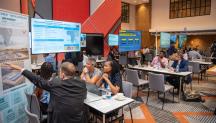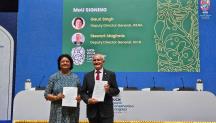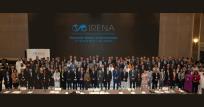
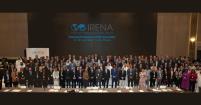
IRENA 14A: Assembly Live Coverage
Newsletter
Welcome to the Fourteen session of IRENA Assembly Live. Follow this page for live blog and live streaming from the Assembly, 16-17 April, and check IRENA social media channels for updates on #IRENA14A.
The sessions will be live-streamed on this webpage, all recordings can be accessed below.
Watch the IRENA 14A: Ministerial Roundtables, 17 April below:
IRENA Fourteenth Assembly is now officially resumed. H.E. Mr Jimmy Gasore, President of the 14th IRENA Assembly and Minster of Infrastructure, Rwanda, opened the meeting delivering brief remarks, saying "COP28 brought as historic progress through the UAE Consensus (...) including the call to triple renewables and double energy efficiency by 2030." He continued his remarks reminding the attendees that the IRENA latest brief on Tracking COP28 Outcomes outlined that the added annual renewable capacity in 2023 was record high, yet far from what is necessary.
H.E. Mr Bhupinder Bhalla, Secretary of Ministry of New and Renewable Energy delivered the opening remarks on behalf of H.E. Mr Raj Kumar Singh, Cabinet Minister for Power and New and Renewable Energy, IRENA's 13th Assembly President, confirming India's commitment to just and inclusive energy transition.
IRENA Director-General, Francesco La Camera, concluded his opening remarks underlining that "We are entering a new era of change, one in which the energy transition will drive economic transformation. This change is bringing unprecedented new opportunities that can revitalize economies and lift people out of poverty". He continued saying how the energy transition are central in today’s decision-making and with real impact on everyday lives. "Looking ahead, we know there will be challenges. Some we can anticipate. Others we cannot. But so long as we remain on the path of innovation, collaboration, and determination, we can reach a renewables-based energy future that will underpin a sustainable and more equitable world", he concluded.
In his opening remarks @IRENA DG @flacamera stressed the geographical disparities in renewable energy deployment & said, "We need to be focused & united in advancing solutions we have at the necessary speed & scale to set the stage for post 2030 action." pic.twitter.com/fJYO4rdmkv
— IRENA (@IRENA) April 17, 2024
Antonio Guterres, Secretary-General of the United Nations deleivered his opening remarks saying “Our collective future depends on collective action,” when commenting on the global commitment and action needed for the further adoption of renewable energy. “The renewables revolution is unstoppable, and the phase-out of fossil fuels is inevitable. Our task is to ensure that the transition is fast enough and fair enough to limit the rise of 1.5° and bring the benefits of clean power by 2030," he continued, concluding "Our collective future depends on collective action that makes the work of IRENA critical".
High-Level Plenary on Tripling of Renewables
The high-level session has commenced now with an aim to pinpoint specific, immediate steps to actualise the COP 28 outcomes. The forthcoming discussions will explore how to optimise international cooperation to achieve tripling renewable power capacity by 2030, effectively monitor progress and course correct towards tripling renewable energy capacity targets.
Watch the IRENA 14A: Resumption of the session and High-Level Plenary on Tripling of Renewables, 17 April below:
This discussion will be moderated by Becky Anderson, CNN.
As moderator of the session, Becky Anderson reminded everyone that there is a huge gap between the Global North and the Global South in progress towards meeting the renewables target. She said, "IRENA plays a role in tracking this progress, confirming that the world is off track. So here we are, gathered to explore the challenges and opportunities to make sure the transition is back on track."
In the first intervention during this panel discussion, Kadri Simson, Commissioner for Energy, EU, says that while COP28 was a success, the focus now should be on implementation: "It is all about implementation. 2030 is only six years away, " she said. “COP29 should prioritise renewables and address financing challenges to replace fossil fuels. The EU has significantly raised its renewable targets and is planning beyond 2030. Public funds are insufficient, necessitating improved access to private financing. EU member states are showing great ambition in reducing dependence on fossil fuels, with investments now focused on improving transmission and distribution grids." she underlines. She noted that efforts need to be taken on a more global scale, “The challenge is that public funds are not enough. So, we have to address the issue of how private finance will be accessible to the remaining world," she concluded.
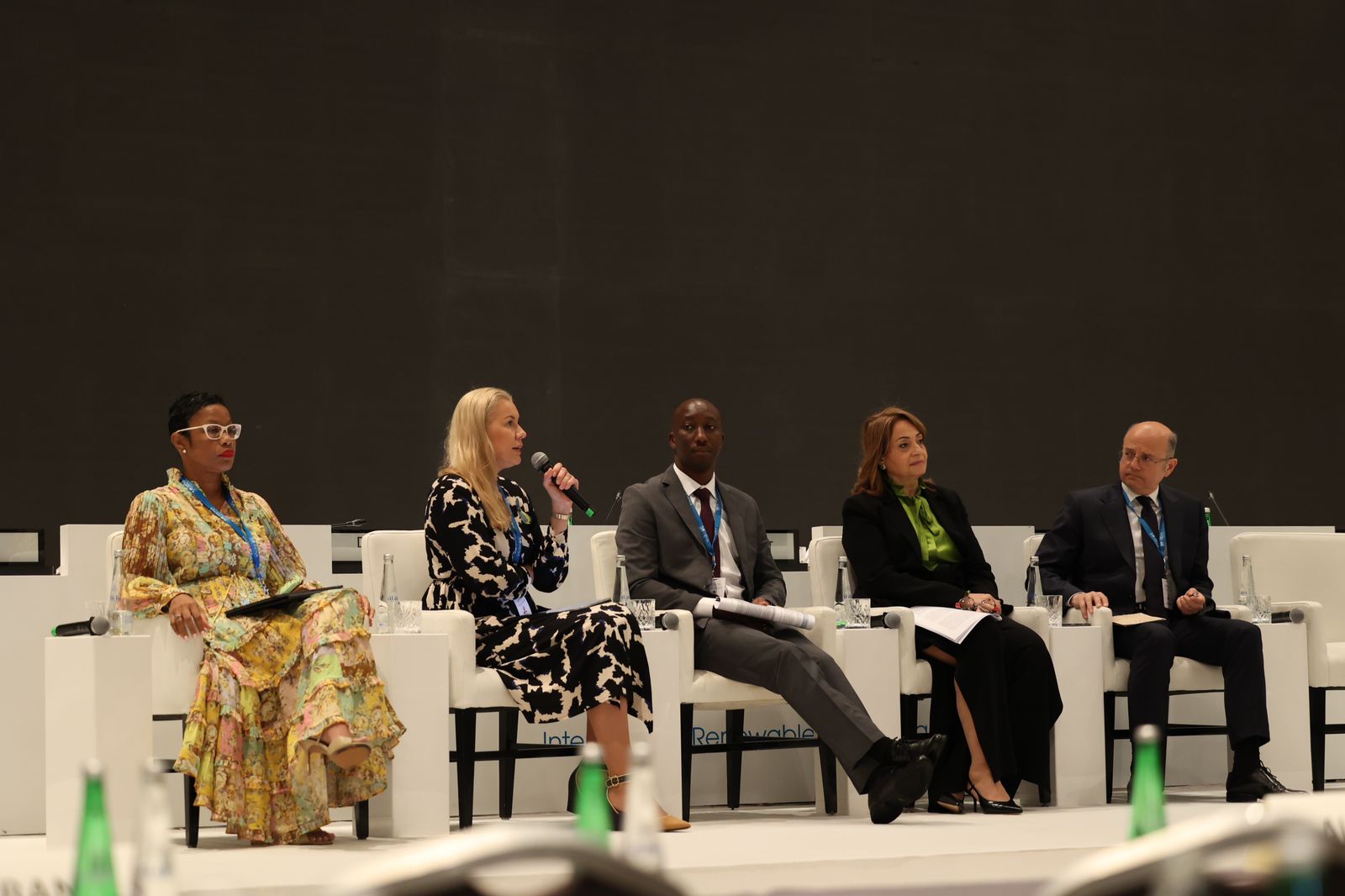
H.E. Dr Amani Abou-Zeid, Commissioner for Infrastructure and Energy, African Union engaged in the panel discussion talking about the renewable energy trends in Africa. Africa's emissions are 3% of global emissions, she underlined, saying that the continent is a home to the largest solar farms. She stated that "Africa is a world leader when it comes to renewables, (...) but is still suffering from serious energy poverty. More than half of our population has no electricity access and 90% of our population do not have access to clean cooking. (...) Africa is endowed with huge potential of renewables,' she concluded. The moderator, Becky Anderson, followed up asking "So what is missing?" the answer is infrastructure and lack of investment. What the world needs is the universal access to electricity and action to achieve it, was the final conclusion of this intervention.
Lisa Cummins, Minister of Energy and Business, Barbados, says that financing should be fit for purpose for developing countries to enable them meet their energy transition targets. “We are in discussions and are already winessing financing pledges, but the problem is the terms and conditions that come with most capital. If the cost of capital is high, it will certainly affect consumer prices, making electricity unfordable for developing countries. So, financing must be fit for purpose for SIDS and other developing countries.
The discussion continues. "We are rapidly developing our renewable sources of energy in Azerbaijan, getting some results by doubling by 2027 and tripling by 2030. The realisation of this plan needs financial support and investment,” says H.E. Mr Parviz Shahbazov, Minister of Energy, Azerbaijan, on the progress made in Azerbaijan while emphasising the need for further cooperation and accessible financing to meet national, regional and global renewables targets.
H.E. Mr Parviz Shahbazov informed about Azerbaijan's progress & further added, "The realisation of our plan to double #energyefficiency by 2027 and #3xRenewables by 2030 will require financial support & investment at regional and global level." pic.twitter.com/V7PaappaCr
— IRENA (@IRENA) April 17, 2024
Dr Amani Abou-Zeid, Commissioner for Infrastructure and Energy, African Union, says that Africa is focusing on doubling energy efficiency and developing the African Energy Information System to address grid wastage of 30-40%. “Upgrading grids can increase energy access by up to 40%. To succeed, we must address both supply and demand. With 65% of Africa's population being young, prioritising energy access is vital for global competitiveness. We are committed to improving the investment climate to achieve these goals.” Continuing her intervention on the needs to accelerate energy transition and develop the relevant infrastructure, she said ""This is an existential crisis. This is something we don't get a chance to redo. We absolutely have to do it and we have to do it now".
“There should be a monitoring framework that allows us to follow what is happening since 132 countries agreed to triple renewables and double energy,” says H.E. Ms Kadri Simson, Commissioner for Energy, EU, on the need for reporting and transparency in the green transition to track the progress made by the global community.
“In Rwanda, we have created the Rwanda Green Fund, which is tapping into the various financial mechanisms to support Rwanda’s green growth. If we can replicate this infrastructure across Africa, it could become the primary funding source for policies, capacity-building, and investments. This fund isn't just philanthropy, it is a business opportunity in renewables,” says Jimmy Gasore, the new President of the 14th IRENA Assembly.
“We are done with strategies, ideas, processes and decisions. It is only time for implementation,” says H.E. Ms Kadri Simson, Commissioner for Energy, EU, on what is needed for the upcoming COP29, with the first panel, focused on national and regional perspectives, is coming to a close.
The panel discussion concludes with a moderator's call for increased financial commitments to address immediate needs. Realigning institutional capabilities will be crucial in accelerating progress effectively.
The second panel focused on implementation is now in progress, Becky Anderson is moderating the discussion on key priorities and actions needed.
At the start of the discussion, Mr. Jose Manuel Entrecanales, CEO, Acciona says “We tend to forget the overwhelming element that moves private capital, which is the risk-reward equation,” highlighting what governments need to do to foster a better financial environment to foster private sector investment. He highlighted the need for capital attraction through regulatory changes in order to increase the adoption of renewable energy.
“Energy storage has become even more crucial,” says Ms Dany Qian, Global Vice President of Jinko Solar Global, on the need for energy storage technology to ensure universal access to clean energy for hard-to-reach regions. She added, “Governments should promote the uptake of advanced storage technologies providing a clear signal to investors and industry players to drive the necessary scale up and remove necessary barriers to towards implementation and cooperation,” when commenting on what governments should focus accelerate the scale-up of renewable energy.
“There are a lot of integrated issues that we can build upon and improve to really help countries to amplify their job sector, their local community needs, and their benefits to really bring more value to the supply chains sector, says Ms. Julia Souder, CEO, Long Duration Energy Storage Council and Chair of the Global Renewables Alliance on the impact that private-public partnership can have to expand the adoption of renewables, increase access and transform communities.
Becky Anderson closed the panel by recapping the need for concrete action in the implementation of climate financing and cooperation between governments and the private sector to meet tripling targets.
Member Interventions have commenced now. Watch the live stream above to follow the live coverage from this session.
Watch the IRENA 14A: General Member Statements, 17 April below:
🔴Press conference at #IRENA14A 📄📸@IRENA Director-General @flacamera addressed members of global media today during the Assembly and reaffirmed the Agency's commitment in accelerating the #energytranstion. pic.twitter.com/Pjc45MgcPu
— IRENA (@IRENA) April 17, 2024
Watch the Press Conference, 17 April
GOWA Ministerial Dialogue: Scaling Finance for Offshore Wind as Key to Reach the Tripling Renewables Goal
This session will showcase immense opportunities in the offshore wind sector, including discussions on investment pathways and mechanisms to attract both public and private sector capital, particularly for developing economies and SIDS to accelerate progress. The participants will have an opportunity to share best financing practices, policy frameworks, and collaborative models that enable rapid expansion of the offshore wind sector while promoting a just and inclusive energy transition.
Dr. Anders Hoffmann, Deputy Permanent Secretary, Ministry of Climate, Energy and Utilities, Denmark delivered the introductory remarks, underlining that offshore wind is a reliable energy source, compatible with other technologies. Mr. Ben Backwell, Global Wind Energy Council (GWEC) CEO echoes his remarks saying that offshore wind is a tried and tested technology. “We are not yet on the right pathway to meet our targets, but we are optimistic we can with the right policy levers,” he stated.
The panel discussion focused on the need for robust global collaboration and forging strategic partnerships among governments, investors, multilateral organizations, and the wider offshore wind industry as a key for widespread deployment. The participants concluded that prioritizing adaptable and innovative financing solutions is vital not only for accelerating the growth of offshore wind globally but also for ensuring a just energy transition that benefits developed and developing nations alike. Shamini Selvaratnam, Associate Director International Climate and Clean Energy, Ocean Conservancy pointed out that “Concessional finance has a critical role in bridging the gap between the potential and deployment of responsible offshore wind.”
The discussion ended with a conclusion that the challenges can be addressed through establishing clear policy frameworks, de-risking projects through guarantees and tailoring financial solutions that address the specific needs of developers and investors.
Accelerating ASEAN’s Growth and Resilience: Grid Interconnections Power the Tripling of Renewables
In this session, ASEAN's significant renewable energy potential and investment opportunities were showcased. The aim of the session is to explore strategic international partnerships opportunities, identify and share successful initiatives, policies, technical solutions, and financing mechanisms within the ASEAN region and globally. the participants also discussed strategies for strengthening regional institutions and collaboration mechanisms to advance grid interconnection efforts. Opening the session, Roland Roesch, Director IITC IRENA said that “ASEAN member states can play a significant role in tapping into its vast renewable resources potential, strengthened through regional interconnections,” setting a scene for the forthcoming discussion.
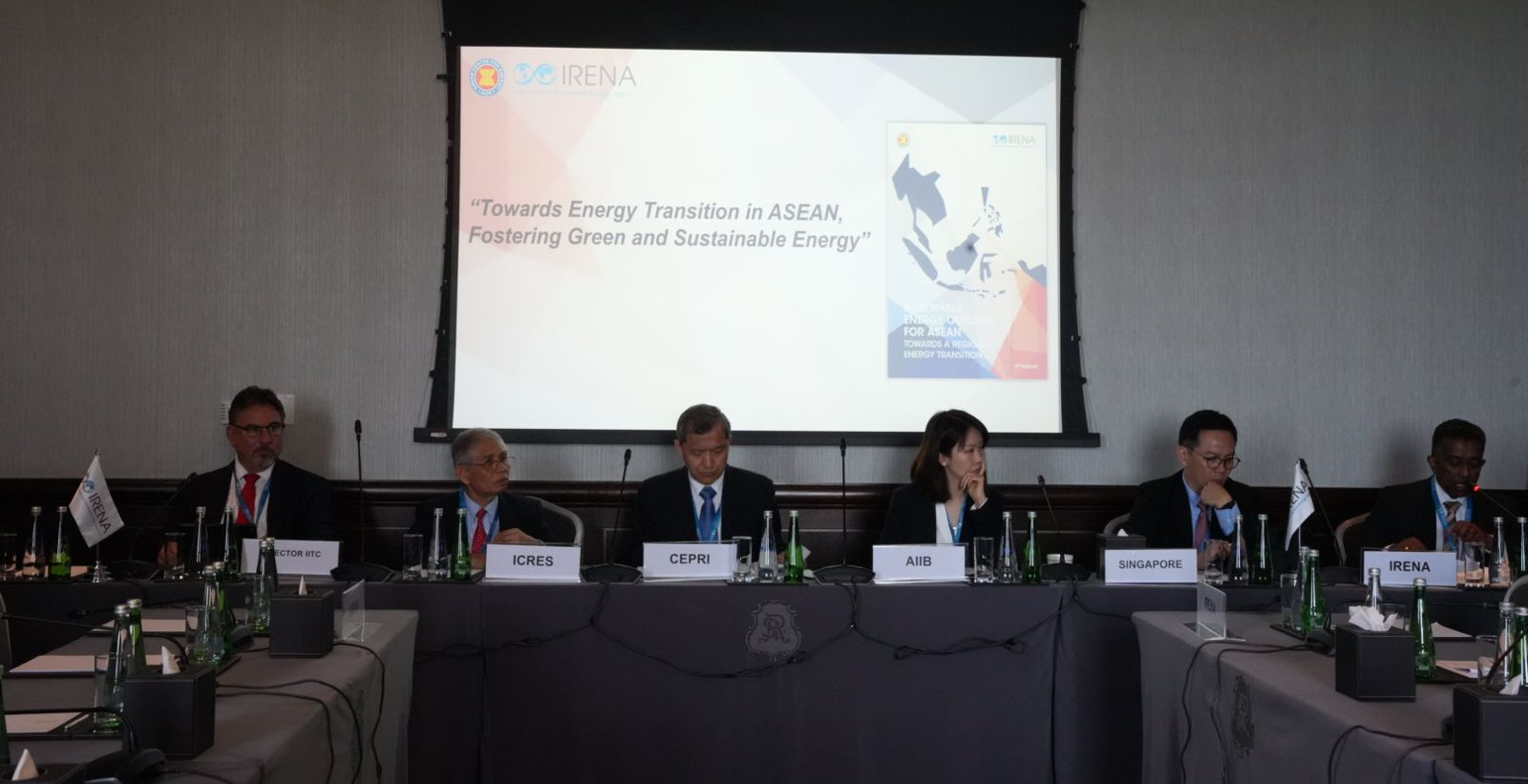
“Grid infrastructure is a very important foundation to realize the target to increase RE on the power system” said Mr Wang Weisheng, Chief Engineer, China Electric Power Research Institute (CEPRI), China. Mr. Jonathan Goh, Director, External Relations, Energy Market Authority (EMA), Singapore added that trading power requires a fundamental rethink of power generation and how you trade power as a commodity, with related policy changes. "There is a host of revelations and policies that need to be established because they are not existing today," he concluded.
The key message echoed in the discussion focuses on power trade requiring a fundamental rethink of the existing policies at a national and regional level with increased levels of coordination across multiple institutions and governments to realize the regional interconnections for further decarbonization of the ASEAN power system. Technological solution, such as subsea cables, are emerging as a critical infrastructure for the interconnection of the ASEAN region. Yet, international cooperation and knowledge exchange between countries that have successfully integrated high levels of renewable energy into their grids is crucial.
Ministerial Roundtable: Geopolitics of Energy Security
This event has just started with the opening remarks from H.E. Mr. Rafael Orlando Gómez Del Giudice, Vice Minister of Energy of the Ministry of Energy and Mines, Dominican Republic who welcomed the delegates, highlighting the importance of renewable energy in the changing energy security landscape. This Roundtable aims look at future energy security challenges as the world moves towards renewable energy. Panelists will explore how renewables enhance energy security, impact local production and global markets, and the importance of international cooperation for a secure renewable future.
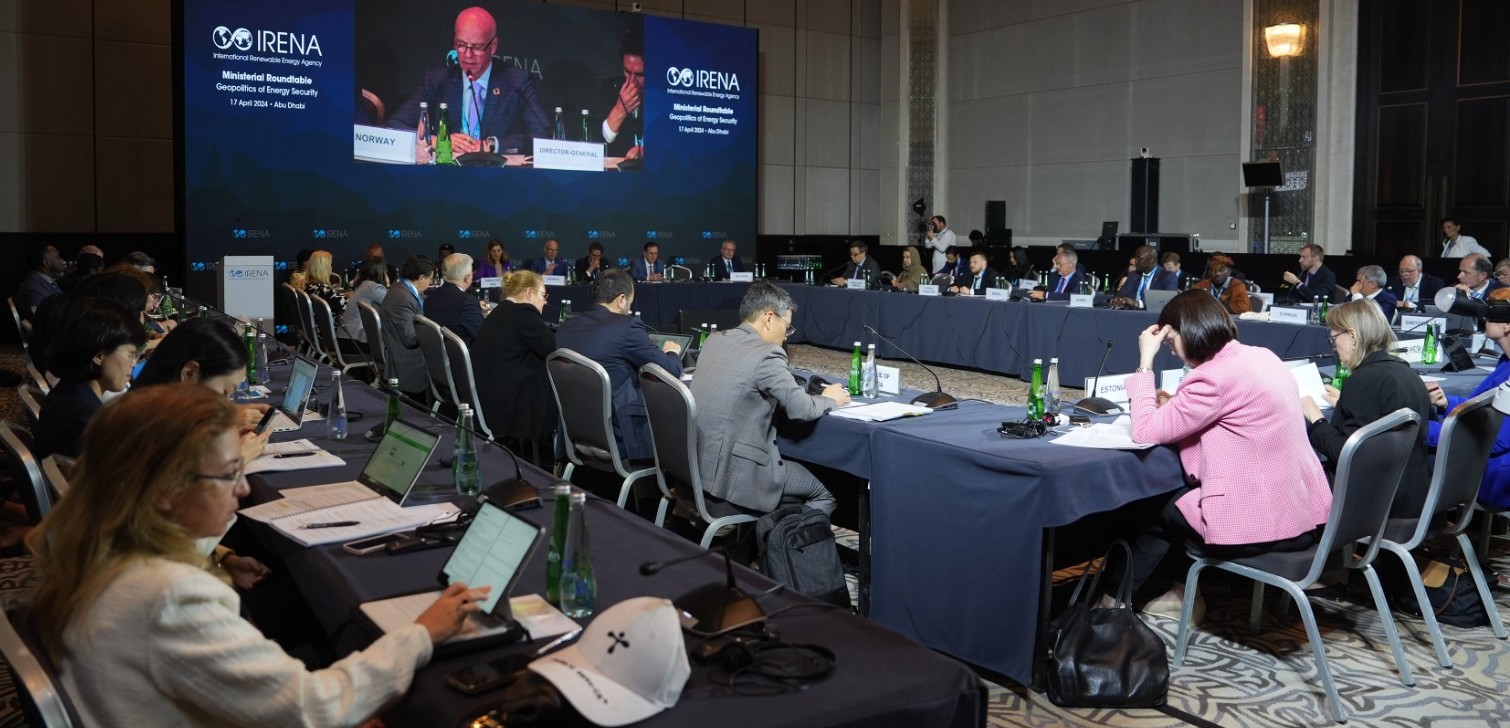
During his opening remarks, Hans Olav Ibrekk, Special Envoy, Climate and Security, Section for Energy, Climate and Food Security, Norway, reflects on IRENA's work on geopolitics of energy transition. “Energy transition is a major geopolitical force and it will actually reconfigure many elements of international politics that have shaped the global system since the Second World War. This will affect the sources of national power, the process of globalization, relations among great powers, create brand new dependencies, and also impact the ongoing economic convergence of developed and developing countries,” he stated.
Discover the series of Geopolitics of Energy Transition reports on irena,org, including the latest report launched today on the topic of Energy security
“Geopolitical risks is not an argument for inaction – quite the contrary – approaching the clean energy transition with a clear-eyed understanding of the risks is essential to tackling the climate crisis,” concluded H.E. Mr. Hans Olav Ibrekk.
Ms Elizabeth Press, Director of Planning and Programme Support, IRENA, has delivered a scene-setting presentation, showcasing the new report and talking about the multi-dimensional approach to energy security.
“86% of the population lives in the next importing country”, says Elizabeth Press, Director of Planning and Programme Support at the International Renewable Energy Agency, underlining the precarious nature experienced by countries during the energy transition when delivering a scene-setting presentation. She presented key findings from the Geopolitics of the Energy Transitions: Energy Security, noting the need for a collaborative effort and a multi-dimensional approach needed to energy access, “The conversation that we can have in this setting is critical as a framework for the investment to go into the right areas in a sustainable way.
Discussed w/ ministers at #IRENA14A how the transition to #renewables calls for a new approach to #energysecurity. Governments must proactively shape strategies, policies & investments. @IRENA’s new report outlines a multi-dimensional security concept 👉https://t.co/CAUIGdTMqu pic.twitter.com/VOf2hBDYrF
— Francesco La Camera (@flacamera) April 17, 2024
Mr. John Defterios, Visiting Professor of Business, New York University Abu Dhabi opened discussions by summarising some of the recent challenges and bottlenecks in the energy transition. He also made note of how these moments also serve as an opportunity for countries can rally together to chart the course away from fossil fuels to meet the 1.5°C energy scenario.
The discussion on the energy security continues. Ms. Kadri Simson, Commissioner for Energy, European Commission provided an overview of the current situation in the region. “We are prioritizing energy transition and energy efficiency in order to reduce our dependency on fossil fuels. We have replaced a significant share of natural gas with renewables and we have been able to stabilise markets in Europe. Last year, 70 GW of renewables and 3 million heat pumps were installed across Europe last year. By bringing down the cost of technology, renewable will become more affordable and more widespread in Europe.” She concluded highlighting a vital importance of renewables in the energy mix to ensure affordable energy access to all.
"Our next target is to remove fossil fuels in power generation and move rapidly to renewables. However, despite the technologies being developed, as a small island nation not connected to the energy grids of regional countries, our recent efforts are to connect to Israel and Crete. This means that Cyprus will be connected to Europe. If we manage to get this niche market of electricity to the major of the EU, it is like having a unified energy market that Cyprus can enjoy.” – H.E. Mr. George Papanastasiou, Minister of Energy, Commerce and Industry, Cyprus on the challenges and opportunities faced by small island nations in their efforts to secure energy access through interconnectivity with regional countries.
Continuing the discussion, Ms Anna Shpitsberg, Deputy Assistant Secretary for Energy Transformation, Bureau of Energy Resources, Dept. of State, USA, says “Diversifying investment is crucial to mitigate energy risks, not create new ones. The U.S. is partnering with Korea to invest in critical minerals for the energy transition, ensuring a sustainable and secure supply chain."
Francesco Corvaro, Special Envoy on Climate, Ministry of Foreign Affairs, Italy says, “Our countries are neither resilient and nor independent. We are working a lot at the international level and the G7 to increase renewable energy installation to reduce dependence on international energy markets and to mitigate risks associated with geopolitical tensions." He continued his intervention underlining the need for new infrastructure, which will also create job opportunities for young people. In addition, he mentions that Italy is encouraging its citizens to become energy producers i.e. the prosumenrs, not just consumers of energy.
“We need diversification and reliance by means of renewables”, says Mr. Marcus Hicken, Director for Energy Diplomacy, Climate and Security, Federal Foreign Office, Germany, when reflecting on the geopolitical tensions faced by Germany and the need for an accelerated energy transition.
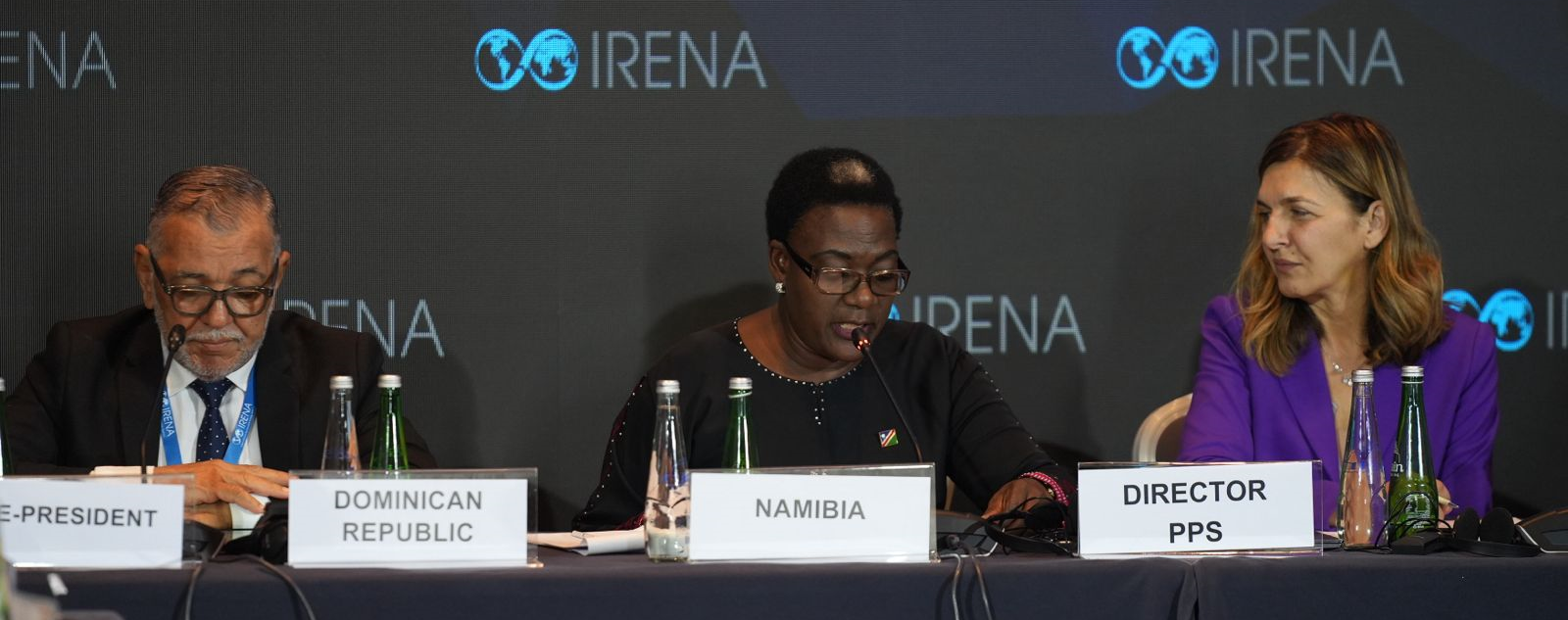
H.E. Ms. Kornelia Shilunga, Deputy Minister, Minister of Mines and Energy, Namibia closed the Ministerial Roundtable on the Geopolitics of Energy Security by highlighting the need for the diversification of energy sources, the domestic potential that countries have in renewables, and the modernisation of energy storage solutions. The energy transition requires a multi-stakeholder approach towards the accelerated adoption of renewable energy to reduce dependencies and vulnerabilities in order to attain an equitable, just and secure energy transition.
Ministerial Roundtable on the Infrastructure for the Energy Transition: Utilities for Net Zero Alliance
This roundtable discussion aims to address the crucial role of infrastructure in the energy transition and achieving the goal of tripling renewables by 2030. Key discussions will address overcoming barriers, accelerating the energy transition to cut emissions, and unlocking the utility sector's potential to meet Net Zero targets by addressing structural, regulatory, and financial challenges.
In his opening remarks at the Ministerial Roundtable ‘Infrastructure for the Energy Transition: Utilities for Net Zero Alliance’, H.E. Dr Jimmy Gasore, Minister of Infrastructure of Rwanda and 14th Assembly President noted the shifts towards renewable electricity and green hydrogen that are crucial to reducing carbon emissions, requiring a redesign and strengthening of energy infrastructure.
“Achieving this ambitious target requires a fundamental transformation of our energy infrastructure,” says Mr Francesco La Camera, Director General, IRENA, on the changes needed to meet tripling targets and doubling energy efficiency. “This includes modernising and expanding electricity grids and integrating storage solutions.”
“We need a 'Marshall plan' for power infrastructure development, and it is not an exaggeration to say that we literally need to rewire the energy system today,” says Mr. Jasim Thabet, CEO TAQA, Co-Chair UNEZA on the ambitious actions needed to modernise and expand the current energy infrastructure in the shift towards renewable energy. He highlighted the importance of global cooperation across industries and governments needed to make a significant difference in upgrading the energy grid to accelerate the energy transition, tripling renewable energy capacity and doubling energy efficiency by 2030. “The alliance members collectively reaffirm their commitment to increase their combined renewable energy capacity to 750 gigawatts by 2030, which is close to 2.5 times their joint capacity today," he concluded.
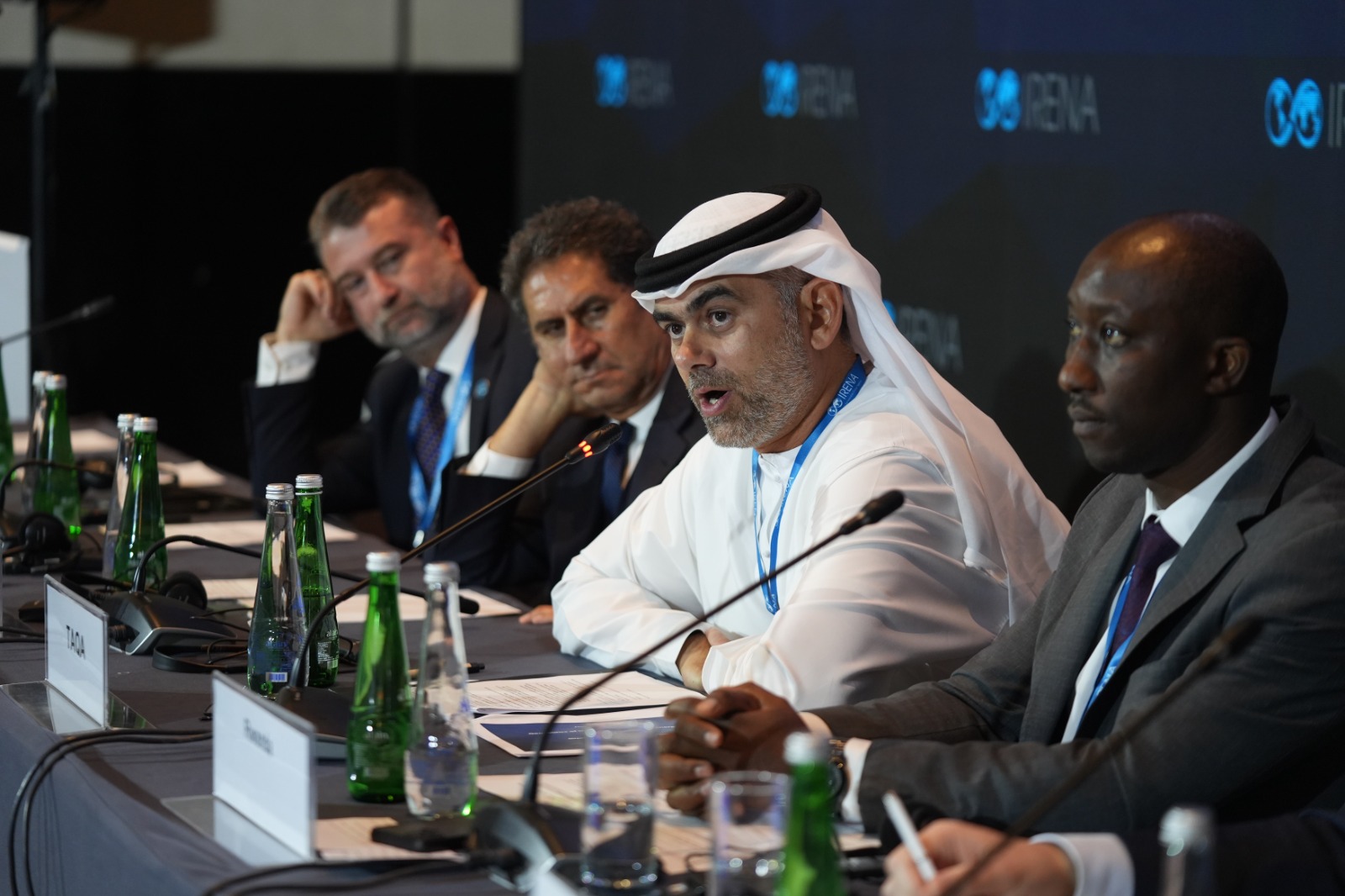
Mr. Martin Pibworth, COO, SSE, Co-Chair UNEZA, continued the discussion focusing on the role that the governments can have in incentivising the build-up of reliable renewable energy solutions to modernise the infrastructure needed for the energy transition. “Offshore wind, which has been a major success story in the UK, has been the engine behind the decarbonising of the power sector. There are many positive lessons to take from this, including the value of long-term government commitments enshrined in good law and innovative policy mechanisms to derisk investments to lower the cost of capital," he stated.
In a scene-setting presentation from Mr Gurbuz Gonul, Director of Country Engagement and Partnerships, IRENA, he called attention to urgent actions and international cooperation saying, “Together we can join our sources to build the fact base and foundation towards a net-zero future,” emphasising an approach focused on action to implement projects on the ground based on best practices to accelerate the energy transition in the power sector.
“The main challenge for public authorities to succeed in the energy transitions is the financing of networks and the interconnection of networks and the financing of infrastructure.” H.E. Philippe Henry, Minister of Climate, Energy, Mobility, and Infrastructure of the Walloon Region, Belgium, on the challenges faced by the public sector, adding that the private sector can help address the infrastructure and labour shortages that have slowed down the pace of renewables adoption and installation of relevant infrastructure “It is important to have collaboration on the international level and the local level to facilitate the holistic approach needed for the energy transition.”
Luc Rémont, CEO, EDF says, “Our ambition at EDF is to accelerate towards net zero emissions as quickly as possible. Currently, we have surpassed the industry average with CO2 emissions at 37 grams per kilowatt-hour, and we are aiming to achieve 22 grams by 2035. In Europe, the average is much higher at 251 grams per kilowatt-hour, providing a clear benchmark for our journey ahead.”
Mr. Anders Hoffmann, Deputy Permanent Secretary of the Ministry of Climate, Energy and Utilities, Denmark spoke on the importance of private-public collaboration to speed up the deployment of relevant infrastructure for further adoption of renewable solutions. “We have been working with industries to find the barriers and get rid of them, creating a task force that found the barrier standing in the way of solar and wind deployment, and to get fossil fuels out of heating in houses. And now the government is looking at all of these suggestions one by one to implement them to make sure that the speed of adoption goes up," he said.
Closing the Ministerial Roundtable of the ‘Infrastructure for the Energy Transition: Utilities for Net Zero Alliance, Ms Melinda Crane reflected on the need to interconnect policymakers and industry in a pragmatic and effective way in order to remove barriers, ramp up financing, and get the legislative frameworks in place to foster an environment to modernise renewables infrastructure needed to meet tripling goals.
Watch the IRENA 14A: Plenary Sessions, 18 April below:
Accelerating the Development of Bankable Renewable Energy Projects – Leveraging IRENA’s Facilitation Platforms for Global Transition
Enhancing the renewable energy mix is vital for a country’s energy transition. However, numerous barriers exist in energy generation, transmission, distribution, storage, and utilisation. These challenges, coupled with funding limitations, impede project development and progress towards universal, affordable, and sustainable energy access. During this session, the panelists will discuss country and regional challenges impeding project development and deployment.
Read an Expert Insight on Five Pillars That Determine Commercial Renewables Projects’ Bankability to find out more.
Mr. Rafael Gomez del Giudice, Vice-Minister of Energy and Mines, Dominican Republic opened the Plenary Session on Accelerating the Development of Bankable Renewable Energy Projects – Leveraging IRENA’s Facilitation Platforms for Global Transition. He spoke about the need for feasible renewables projects needed to bridge the gap between potential projects and actual investments to catalyse the shift towards a more sustainable and renewable energy future.
The opening remarks were provided by Francesco La Camera, Director General, IRENA, who said “ETAF aims to support energy transition by directing financing in key project. 13 strategic partners have made a pledge of US $4 in financing clean energy with a commitment for over 10 GW capacity projects. ETAF target has been revised to reach US $5 in funding and supporting gigawatt projects by 2030.”
Mr. John Defterios opened the panel by speaking about the need for economic innovation and sustainability to make renewable energy projects more bankable and attractive to investors. He called attention to IRENA’s initiatives, like the Climate Investment Platform and the Energy Transition Accelerator Financing Platform in order to leverage its insights in collaborative efforts for a more sustainable and renewable energy future.

Ms. Kadri Simson – European Commissioner for Energy, EU says “Clean energy demands major investments and we are mobilising $300 billion for this through public private partnerships, green bonds and other investment platforms. A lot of investments require reforms that will have an impact on energy systems and also accelerate energy transition. EU will do all it can to get all clean energy projects off the ground.”
Ahmed Badr, Director, Project Facilitation and Support, IRENA delivered a scene-setting presentation for this session. He focused on the barriers to project financing, saying “The cost of capital is high and the pay back cost is not to the level that SIDS and other developing countries can afford. Another barrier is derisking projects with some countries experiencing war risks, not only geopolitical risks." He then continued to provide recommendations on needed solutions, highlighting that "Mitigation of risks along with technology maturity and stability need to be accelerated with the help of enabling policies.”
The discussion has now commenced. Vince Henderson, Minister of Foreign Affairs, International Business, Trade and Energy, Dominica says “There has to be resilience for meaningful transition to happen by strengthening existing systems to enable them seamlessly accommodate renewable energy. For this to happen, we need concessional financing that is more affordable," focusing on SIDS financing needs.
As part of the panel at today's session at #IRENA14A,
— IRENA (@IRENA) April 18, 2024
H.E. Vince Henderson - Minister of Foreign Affairs, International Business, Trade and Energy, Dominica, reiterated the importance of deploying renewable energy technologies in Small Island Developing States. pic.twitter.com/nWw4jrf8uH
Davis Chirchir, Secretary of Energy, Kenya spoke about the country's experience: “Using geothermal as a baseload, we are able to leverage solar and wind where availability is low and bankability is a challenge. By providing proper compensation, we are able to get a number of investors to leverage the competitive tariffs offered.”
“We also now prepared private-public partnership models that will increase the confidence of the private sector.” says Mr. Habtamu Itefa Geleta, Minister of Water and Energy, Ethiopia on actions taken by Ethiopia to increase private sector investment to foster bankability to expand solar, wind and geothermal projects.
“How do we take advantage of the fact that within our neighbourhood, we can provide power to other countries?” asks Mr. Rafael Gomez del Giudice, Vice-Minister of Energy and Mines, Dominican Republic on how to derisk projects to increase renewables adoption within the Caribbean. “IRENA needs to consider the further engagement of development partners within the region." He continued outlining opportunities to develop regional approaches to financing with the help of IRENA, including bringing in regional partners to participate in the deployment of financing of renewable projects to interconnect the region.
Raul Alfaro Pelico, Director of Knowledge, Policy, and Finance Center (KPFC) at IRENA, closed the plenary session, reflecting on the need for a new paradigm on bankability and project impact to derisk investment, increase public-private partnerships and accelerate collaborative efforts to catalyse a global shift towards a more sustainable renewable energy future.
Accelerated Renewable Deployment in Africa
In this session, the participants will explore the African Renewable Power Alliance (APRA) and its strategy for boosting renewable energy in Africa through international collaboration. The panelists will discuss how adapting to the unique needs of different African regions is crucial to overcome challenges, leverage partnerships for greater renewable energy investment, and build a resilient local private sector in Africa's renewable landscape.
IRENA's report "Renewable Energy Market Analysis: Africa and its Regions" charters a pathway to a renewable-based energy system and shows that the transition promises substantial gains in GDP, employment, and human welfare in each region of the African continent.

Mr Davis Chirchir, Cabinet Secretary for Energy and Petroleum, Ministry of Energy, Kenya delivered a scene setting presentation, highlighting Kenya's energy strategy which exemplifies the commitment to harnessing renewable energy sources. "We are close to achieving our target of 100% renewable energy by 2030 to propel our economy forward and achieve energy independence," he underlined. Continuing, he noted that Africa faces challenges in accessing essential financing, which acts as a barrier to realizing its renewable ambitions. “We need an approach tailored to the unique needs of our countries. The lack of proper infrastructure causes stagnation and delays progress. We advocate for a climate change finance model that equips Africa to combat climate change alongside counterparts worldwide. African support for initiatives like APRA drives tangible change in infrastructure and promotes green industrialisation,” he concluded.
H.E. Sheikh Shakhboot Al Nahyan, Cabinet Member and Minister of State, Ministry of Foreign Affairs, delivered an opening statement as an APRA partner, saying “It is our hope to build upon and expand partnerships that are mutually beneficial and that offer economic, environmental and social prosperity leaving no one behind.” His comments called for creating an environment conducive towards investment in Africa so that the adoption of renewables not only meets tripling targets but also has an impact across sectors, including job creation, enhanced livelihoods, health and education.
H.E. Sheikh Shakhboot Al Nahyan, Cabinet Member & Minister of State, Ministry of Foreign Affairs, UAE underscored that we need to expand mutually beneficial partnerships.
— IRENA (@IRENA) April 18, 2024
He called for creating a conducive environment for investments in Africa. pic.twitter.com/afaBOEVhNb
Dr. Amani Abou Zeid, Commissioner for Energy and Infrastructure, African Union commenced the discussion underlining that “International collaborations must be contextualised to address the continent's unique realities and priorities, whether focusing on infrastructure, continental power systems, or Africa's renewable energy initiatives. APRA's alignment and collaboration within these frameworks are essential for success.” She also highlighted the urgent need for the rapid deployment of clean energy cooking, which is often left out of the renewables conversation and impacts Africa on a socio-economic progress and health. “Clean cooking seems to be absent from the conversation, whereas the situation of clean cooking in the context of the continent calls for decisive action. Almost a billion Africans do not have access to clean cooking," she pointed out.
Edgar Moyo, Minister of Energy and Power Development, Zimbabwe says “APRA membership should not merely be seen as individual countries, but as a collective effort representing the entire continent of Africa. The African Union (AU) should provide APRA with a platform to address critical issues impacting Africa's power systems, fostering collaboration and unified action.”
Mr. Edgar Moyo of @official_MOEPD, Zimbabwe called for team effort from Members and said, "APRA membership should not merely be seen as individual countries, but as a collective effort representing the entire continent of Africa." pic.twitter.com/dPoAhsiPIs
— IRENA (@IRENA) April 18, 2024
Contibuing the panel discussion, Ms. Kornelia Shilunga, Deputy Minister, Ministry of Mines and Energy of Namibia says “As SADC members, we have adopted a principle of cost-reflective tariff targets to encourage private sector participation, including private power producers. However, these tariffs can place a heavy burden on consumers, especially those who are poor and vulnerable. We must find ways to address this challenge.” Herbert Krapa, Deputy Minister, Ministry of Energy, Ghana stated “Our focus is on developing a 2,000 MW portfolio of renewable energy projects, and that will necessitate private sector involvement. Progress towards increasing renewable energy in our energy mix to 10% is on track, facilitated by blended finance and patient capital, including green bonds and other financing mechanisms. Investments in grid infrastructure are essential to support this transition.”
Anders Bjørn Hansen, Ambassador of Denmark to the UAE, Permanent Representative of Denmark to IRENA says that Denmark is committed to sharing its renewable energy journey, particularly on integrating variable renewables into the energy mix while ensuring energy security. “Other geographies can learn from our experiences and successes in this area. He adds “A successful green transition necessitates an enabling policy and regulatory environment tailored to each country's unique circumstances. There's no one-size-fits-all approach.”
H.E. Dr Jimmy Gasore, Minister, Ministry of Infrastructure, Rwanda concluded this plenary session, reflecting on the need for collective action through APRA in order to play a catalysing role in the investment and deployment of renewables in Africa. He also called for holistic energy transitions through political leadership, mobilizing commitments from both public and private sectors, and coordinating international efforts to drive the green transition.
Global Geothermal Alliance Annual Meeting
This annual event convenes the Global Geothermal Alliance (GGA) member governments and partner institutions to delve into the geothermal sector's challenges and prospects. Despite geothermal energy's potential for electricity, heating, cooling, and agricultural processing, its growth remains slow despite its capabilities. The participants shared insights and experiences, discussed emerging trends and ways to tackle obstacles, including investment costs and policy gaps.
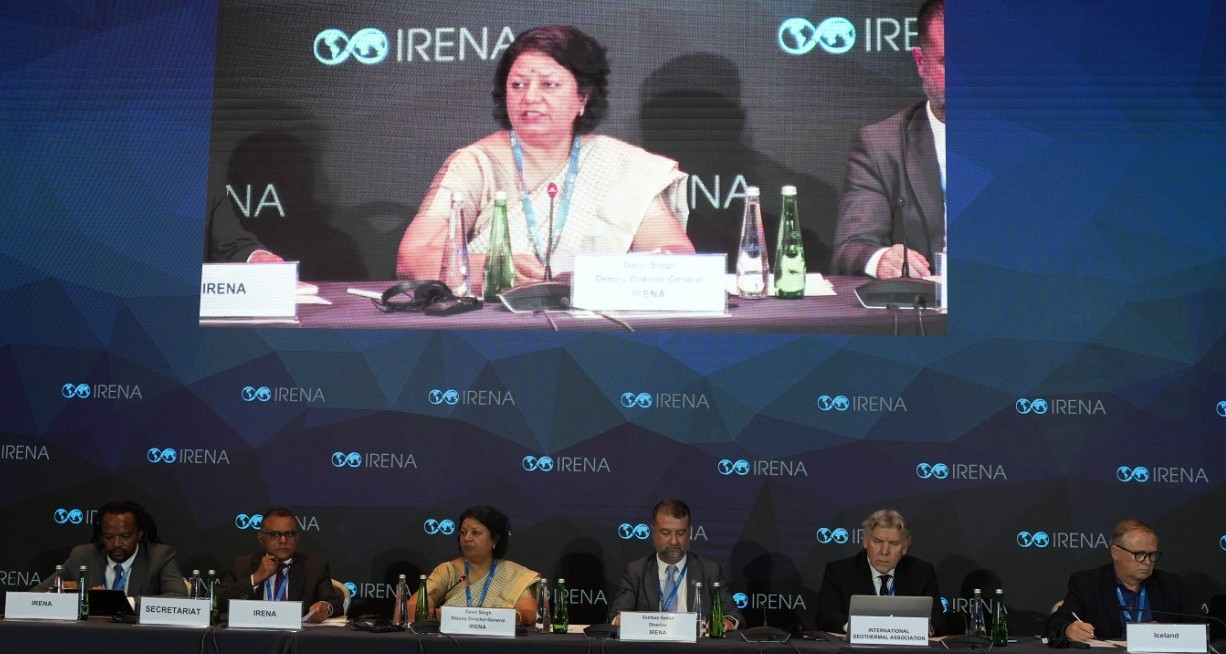
Opening the GGA Annual Meeting, Gauri Singh, Deputy Director-General, IRENA said, "The emphasis on tripling renewable energy capacity by 2030 highlights a critical pathway towards achieving a sustainable, cleaner energy future. Geothermal energy stands as a pivotal component in this transition, offering a blend of reliability, sustainability, and flexibility that is unique in the renewables spectrum."
Policies and Skills for an Accelerated Energy Transition
During this session, the participants will explore policies and strategies to hasten the energy transition, ensure inclusivity, and enhance local benefits. With a particular emphasis on overcoming skills shortages, the discussion will focus on scaling education and training, including upskilling and preparing the youth for renewable energy jobs.
Watch the IRENA 14A: Policies and Skills for an Accelerated Energy Transition, 18 April below:
This plenary session kicks off with Francesco La Camera, IRENA Director General reminding the audience that a successful energy transition requires adequate infrastructure, financing, policies, and a skilled workforce. “An integrated policy approach is key to maximising value and supporting a just and inclusive energy transition. We need robust and resilient global supply chains to maximise local value creation, which involves identifying gaps and generating policies to enhance these supply chains," he said.
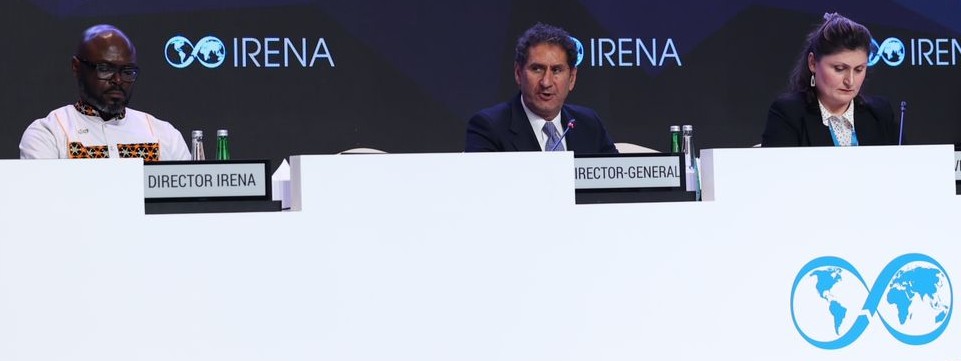
“The energy transition is also expected to increase energy sector employment with renewable energy jobs potentially tripling from the current 13.7 million to 40 million by 2050. Investments in other energy transition-related technologies could result in a substantial increase in job opportunities,” says Raul Alfaro-Pelico, Director, IRENA Knowledge, Policy and Finance Centre. He also made note of possible misalignment of future job opportunities owing to developmental and geographical disparities. He called for just transition policies like tax credits, subsidies, grants, and public research and development to ensure that the misalignments do not become barriers for the renewable energy transition.
In his remarks, H.E. Philippe Henry, Vice-President and Minister of Climate, Energy, Infrastructure, and Mobility of the Government of Wallonia, Belgium, shares the country's experience in the evolution of entire energy systems and its impact on citizens. “In Belgium, we have implemented policies that serve as valuable lessons for others. Some of our wind projects have received opposition. But we have been able to bring stakeholder together to drive active citizen participation and a sense of ownership in all our projects. This is helping us on the demand side as well,” he said.
The panel discussion is moderated by Melinda Crane, DW, who opened the discussion by underlining a need for a swift, just and equitable energy transition to unlock the socio-economic benefits.
HE Miriam Dalli, Minister for Energy, Environment, and the Grand Harbour Regeneration of the Republic of Malta, pointed out the need for a just transition that considers the unique realities of all states, particularly those with geographical limitations. “The technology required differs from that needed in countries with vast spaces. We are focusing on solar and rooftop solutions, but to further increase our renewable percentage, we are exploring offshore technologies. Despite the challenge of deep seas surrounding us, we are investigating full offshore technologies like floating wind turbines and solar installations,” she said.
Prof. Izael Da Silva, Deputy Vice-Chancellor Research and Innovation at Strathmore University, Kenya, talked about challenges hindering the development of clean energy technologies across Africa. One major issue is the lack of adequate financial mechanisms to attract investors for both off-grid and on-grid technologies. “The high debt burden, ranging from 13% to 18% in loans, deters many potential investors due to the associated capital costs,” he said.
“We need to be looking at workforce development and training, factoring that into roadmaps and into the translation of tripling on the ground. We need to be looking at collaboration with education institutions and I see a big space for civil society organisations to have a meaningful impact in the clean energy transition," contributed Ana Rovzar, Director of Policy & Public Affairs of the Global Renewables Alliance (GRA) focusing on the multistakeholder collaboration that is required to build a skilled workforce to expand the talent pipeline for a renewable energy future."
Ana Rovzar, Director of Policy & Public Affairs at @GRA_Renewables called for multi-stakeholder collaboration for building a skilled workforce.
— IRENA (@IRENA) April 18, 2024
"We need to be looking at workforce dev. & training, factoring that into roadmaps & into the translation of #3xRenewables on ground." pic.twitter.com/Xv0cM5CZOO
“We need to scale up green education and skills training. The analysis the OECD has done shows we are facing a very severe shortage in green skills, and that risks slowing down the race to net-zero,” Jo Tyndall, Director for the Environment Director (OECD) said. She further discussed the need for targeted skill training for an accelerated renewables transition. She called for the need for governments to be proactive over reactive when it came to their educational and training policies, saying, “To overcome this, policymakers have to prioritise lifelong learning systems, and that’s for agility and the ability to be responsive to changing circumstances.”
The Youth Representative, Nina Seime Bot-Timothy, Career Training Program Coordinator at Student Energy, provided a youth perspective on the need for a nuanced approach to tackling common challenges in energy transition. “It is not a one-size-fits-all approach. While we may face similar challenges, the underlying causes differ, requiring individualised solutions. We need to prioritise including youth in budgeting for apprenticeships, providing opportunities for hands-on learning,” she pointed out.
Closing the session, the moderator, Melinda Crane concluded that getting all stakeholders from different sectors on board to work closely together is the main ingredient to advance capacity building efforts in the energy transition. Access to job opportunities for young people also needs to be more equitable. Panelists agreed IRENA should continue to provide the platform for young people to build capacity, skills, and gain the opportunities to explore jobs that contribute to the energy transition.





